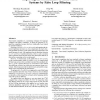Free Online Productivity Tools
i2Speak
i2Symbol
i2OCR
iTex2Img
iWeb2Print
iWeb2Shot
i2Type
iPdf2Split
iPdf2Merge
i2Bopomofo
i2Arabic
i2Style
i2Image
i2PDF
iLatex2Rtf
Sci2ools
121
click to vote
ASPLOS
2011
ACM
2011
ACM
Improving the performance of trace-based systems by false loop filtering
Trace-based compilation is a promising technique for language compilers and binary translators. It offers the potential to expand the compilation scopes that have traditionally been limited by method boundaries. Detecting repeating cyclic execution paths and capturing the detected repetitions into traces is a key requirement for trace selection algorithms to achieve good optimization and performance with small amounts of code. One important class of repetition detection is cyclic-path-based repetition detection, where a cyclic execution path (a path that starts and ends at the same instruction address) is detected as a repeating cyclic execution path. However, we found many cyclic paths that are not repeating cyclic execution paths, which we call false loops. A common class of false loops occurs when a method is invoked from multiple callsites. A cycle is formed between two invocations of the method from different call-sites, but which does not represent loops or recursion. False loop...
Related Content
| Added | 24 Aug 2011 |
| Updated | 24 Aug 2011 |
| Type | Journal |
| Year | 2011 |
| Where | ASPLOS |
| Authors | Hiroshige Hayashizaki, Peng Wu, Hiroshi Inoue, Mauricio J. Serrano, Toshio Nakatani |
Comments (0)

